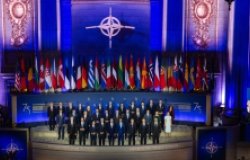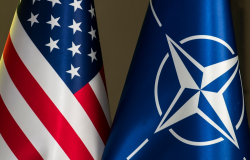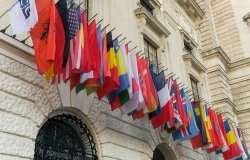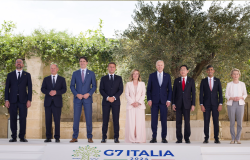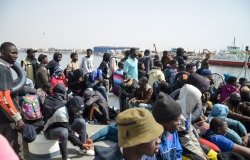197. Post-Tudjman Croatia: Time to Rethink Western Policy
The U.S. has a tendency to repeatedly back the worst of candidates in foreign elections. This is especially true in Eastern Europe where high marks are given for the candidate's ability to be charming, speak good English and wear deodorant but who otherwise have zero effectiveness in their own societies.
An illustrative example is the case of Croatia's recent presidential elections. Despite official disclaimers, all signs indicated that the U.S. was backing the moderate Foreign Minister Mate Granic, the Croatian Democratic Community (HDZ) candidate. Granic, however, did not even make the cut for the second round, coming in a distant third during the first round. Even then, the U.S. again chose to throw its support behind the eventual loser - Drazen Budisa, the nominee of the larger, two-party ruling coalition of Social Democrats (SDP) and Social Liberals (HSLS) and a former dissident, though a proven, if mild, nationalist.
Stipe Mesic, the candidate of the smaller four-party coalition and the eventual winner of the presidential election with 56.2% of the votes (a 12% margin over Budisa), carried 17 of the 21 counties (including Zagreb) despite the lack of the establishment's endorsement and despite the lack of local press and media support. Mesic was also not the West's favorite, despite his outspoken record denouncing Croatian war crimes and the eviction of Serbs in Zagreb, despite running on a platform committed to bringing about several programs the U.S. would otherwise be delighted to see happen - such as getting rid of 3 of the 4 secret service operations, cutting military spending and ending subsidies of the Croatian community in Bosnia, as well as advocating the return of Serbian refugees as fully reinstated Croatian citizens. We did not back him simply because he is a former communist. Yet, the late President Franjo Tudjman - a former Western darling - was not only an ex-communist but was reputed to have been the youngest general in Tito's army. To be sure, Tudjman was a "family man" - he made sure all in his family profited, hugely, from his role - but not the kind of family-man we normally support. Obviously the past is not much of a guide to some personalities and current behaviors.
The kind of staunchly anti-nationalist language employed by Mesic, a candidate running in Croatia which, we are told, much like the rest of the Balkans was still dominated by ethnic nationalism, should give us pause about just how nationalist the current scene is. This kind of language also questions just how deeply entrenched nationalist beliefs really are in what the West calls "historical hatreds." Nationalism in the Balkans has always been a mile wide and an inch deep. It is a residual ideology which can be consciously activated by the political elites in Zagreb and Belgrade through a relentless use of the regime-controlled media.
The election demonstrates that in Croatia - which was more openly and explicitly nationalist than Serbia in public dialogue, though it is the latter that is on a rampage of war- making in the region - nationalism has stopped being effective politically. This would explain why nationalism is currently being ditched with lighting speed by the local politicians.
The presidential elections, even more so than the recent parliamentary elections which awarded 95 seats out of 151 to the two winning coalitions of opposition parties, should be interpreted as a signal of the imminent, rapid disintegration of the formerly ruling HDZ into two if not three parties. This election also consolidates a far more serious and dramatic break with Tudjman's nationalist and anti-Western politics than the international press has indicated. Then again good news is not news.
What is dangerously close to being lost is the recognition of an historic opportunity, a breakthrough which will not last long. There is an immediate enormous challenge both to us and the Croat opposition and I fear we will mess it up.
We, the West, will mess it up for the following reason - we have never learned to wield a proper carrot. We know how to wield a stick, as Kosovo has shown, but not a carrot. If the piddling eight million dollars in assistance that our Secretary of State came bearing to the new government is an indication of how we intend to treat the new democratic government in Croatia, I fear for our policy and for Croatia.
Croatia has a devastated economy which has been deliberately ravaged: a currency which is overvalued by at least 40%; enterprises stolen and sold off to the mafia and then bled dry; and an economic austerity policy which makes the World Bank happy but the Croatian population, miserable. Yet, if the new government will try to hold the line on austerity, as it has already begun with Prime Minister Ivica Racan's imposition of 40% wage cuts for parliamentary members and high government officials, heads are going to roll in a way that will make the financial community in the West very unhappy. They will be the heads of people we know, who wear Italian suits, who drive Mercedes, who speak good English and who are thieves with whom we have dealt and to whom we have become accustomed and blindly support.
This U.S. tendency to back the candidates or opposition parties "most like us" also serves as an explanation for relations or lack of relations with other, more dominant forces in Croatia as well as the lack of effectiveness of the opposition backed by the West in Bosnia and Serbia.
The main party in the current ruling opposition coalition - the former communists, now the relatively moderate Social Democratic Party - was ushered in not by the new class favored by the West but by pensioners and unionists. With this in mind, it would be political suicide for the leader of this political party, Prime Minister Racan, to carry out what the West's financial community has been most pushing for - the IMF economic austerity formula for Eastern Europe. This action would in fact constitute a betrayal of the party's very electorate. And if the election results in a drop of living standards - which it will if the new government attempts to ingratiate itself with the West by imposing IMF-dictated spending cut backs - democracy will suffer greatly. It is the one thing that can revive the HDZ and increase skepticism about democracy in the one Balkan country in which democracy may actually have a shot. Instead, our advice should be to roll the debts somehow, to take it easy on cutbacks of an already battered welfare state and the health and education systems essential to any society. Unfortunately this runs against the grain of every aspect of the shock therapy, quick- fix recipe the West has preached since 1989.
What is needed now is an urgent reassessment of policy towards Croatia coupled with a large aid package. This would clearly demonstrate the West's willingness to devote a fraction of the millions spent on dropping bombs on the first chance we have for a democratic government in the Serbo-Croat speaking region - a government which would have obvious larger implications for both Bosnia and Serbia. It would also set in motion a series of events which could eventually work together to stabilize the entire region.
There is an obvious connection between the Croat Social Democrats and the Bosnian Social Democrats - the largest opposition party in the Bosnian trilateral government which shares with its Croatian counterpart the distinction of being ignored by the West due to its ex- communist make-up. Yet this very link could be used to once and for all sever HDZ ties and control in Bosnia. Mesic's anti-nationalist message would help reorient Bosnian Croats towards their own nation's capital - Sarajevo - instead of the current reliance and dependence on Zagreb, finally eliminating the disturbing voting patterns of the Bosnian Croats in Croatian elections and possibly even resolving the vicious cycle of refugee returns.
A friendly, democratic and stable Croatian government would also improve relations with and help stabilize Republika Srpska and Banja Luka, which have traditionally been economically and culturally oriented toward Zagreb rather than Belgrade. This would lessen hard-line Serbian influence and pressure and maybe even lead to a massive scaling down of military forces in Croatia and Bosnia.
In Belgrade the effect of these democratic elections on public opinion has been curious. Simply put: envy. Bitter envy on the part of the opposition intellectuals because the Croats were reputed to be more vociferously nationalist and more repressive under Tudjman than the Serbs, yet Croatia made the cut.
Part of the problem is the West's traditional tendency to back the wrong people - admirable in their own right for qualities such as love for the market and being English speaking and generally pro-Western - but not very endearing to their electorate. Another difficulty consists of the lack of an actual recognizable party platform or program among the opposition in Serbia. In the long-run, the demonstration effect of a stable democratic Croatia will impact even Belgrade.
The West, especially the U.S., should go back to the drawing board and rethink who we support. This is true for Croatia as well as Bosnia and Serbia. There is still time for us to help make something good happen in the Balkans, but we need to do it soon.
Bogdan Denitch spoke at an EES Seminar on February 10, 2000
About the Author
Bogdan Denitch
Read More
Global Europe Program
The Global Europe Program is focused on Europe’s capabilities, and how it engages on critical global issues. We investigate European approaches to critical global issues. We examine Europe’s relations with Russia and Eurasia, China and the Indo-Pacific, the Middle East and Africa. Our initiatives include “Ukraine in Europe” – an examination of what it will take to make Ukraine’s European future a reality. But we also examine the role of NATO, the European Union and the OSCE, Europe’s energy security, transatlantic trade disputes, and challenges to democracy. The Global Europe Program’s staff, scholars-in-residence, and Global Fellows participate in seminars, policy study groups, and international conferences to provide analytical recommendations to policy makers and the media. Read more



